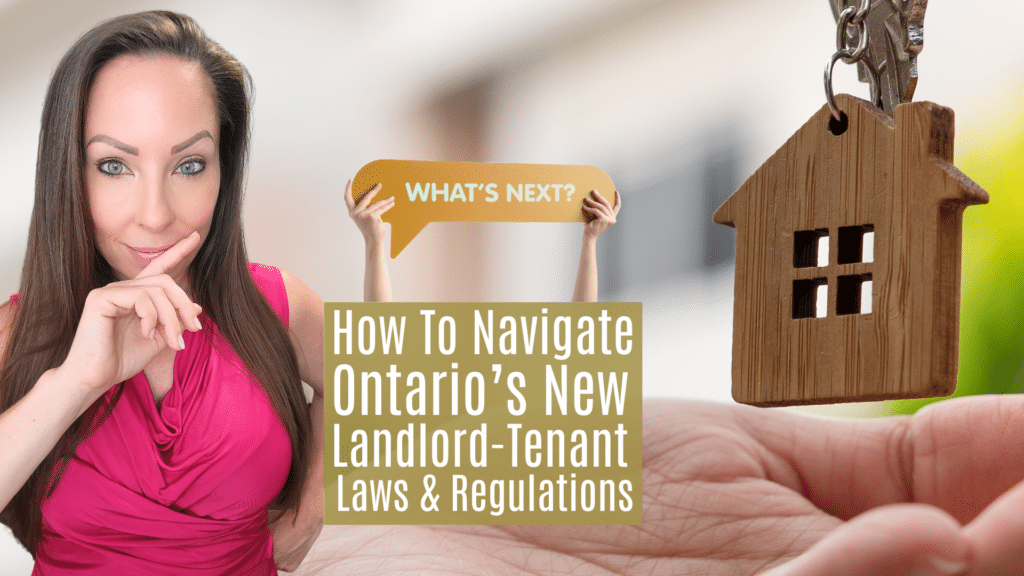
Navigating Ontario’s New Landlord-Tenant Regulations: A Comprehensive Guide for Property Owners and Landlords
Owning and managing rental properties in Ontario can be a rewarding venture, but with recent changes to landlord-tenant regulations, staying informed is more important than ever. The evolving legislative landscape has left many property owners feeling uncertain about their rights and responsibilities, making it essential to adapt and protect both their investment and tenant relationships.
If you’re a property owner or landlord, you’ve likely heard about some of these changes to Ontario’s Residential Tenancies Act (RTA). These updates are designed to address various challenges in the rental market, such as housing shortages, tenant protection, and rising living costs. While the intention is to create a fair balance between landlords and tenants, it’s crucial to understand how these new regulations impact your role and what steps you should take to remain compliant.
In this blog, we’ll explore the key changes to Ontario’s landlord-tenant regulations, discuss their implications, and provide practical strategies for property owners to successfully navigate these new rules. Whether you’re a seasoned real estate investor or a first-time landlord, these insights will help you adapt and protect your interests.
1. Understanding Ontario’s Residential Tenancies Act (RTA) Updates
The RTA is the cornerstone of Ontario’s rental regulations, governing the rights and responsibilities of landlords and tenants. In recent years, several amendments have been introduced to address concerns like affordability, eviction processes, and tenant protections. Some of the most notable changes include:
i) Restrictions on Evictions During COVID-19 and Beyond
During the pandemic, the Ontario government introduced eviction moratoriums, which significantly restricted landlords’ ability to evict tenants for non-payment of rent or other reasons. Although these moratoriums have ended, landlords still face new challenges. Ontario courts are now more critical of eviction applications, particularly when they involve tenants in financial distress.
As a landlord, this means you need to be prepared for potentially lengthier eviction processes. Courts are more likely to encourage mediation and payment plans, rather than automatically approving eviction orders. If you’re planning to evict a tenant, ensure that you’ve followed all required steps and explored alternatives like rent deferrals or payment arrangements.
ii) Rent Control Regulations
Ontario’s rent control system caps rent increases for most residential units, with annual increases tied to the Ontario Consumer Price Index (CPI). For 2024, the rent increase guideline is set at 2.5%, which is the maximum percentage landlords can increase rent without approval from the Landlord and Tenant Board (LTB).
However, not all properties are subject to rent control. For buildings constructed after November 15, 2018, rent increase limits don’t apply, offering more flexibility to landlords. If your property falls into this category, you may raise the rent at your discretion, provided proper notice is given.
iii) N12 Notices and Landlord’s Personal Use of the Property
Landlords who wish to reclaim their property for personal use, such as moving in a family member, must issue an N12 notice. However, stricter regulations now govern the use of N12 notices. If a landlord issues an N12 notice and fails to occupy the property as stated, they could face fines or even a tenant’s application for bad faith eviction.
Additionally, landlords are now required to compensate tenants with one month’s rent if they are evicted for personal use of the property. This rule applies even if the landlord or their family member genuinely needs to move into the unit, adding an extra layer of financial consideration for property owners.
iv) New Procedures for “Renovictions”
A “renoviction” occurs when a landlord evicts a tenant to undertake extensive renovations or repairs to the rental unit. The RTA now mandates that landlords provide a detailed renovation plan and must offer tenants the right of first refusal once the work is complete. Landlords must also prove that the repairs are necessary and cannot be completed with the tenant in place.
Failing to follow these steps could result in significant penalties, including orders to compensate tenants for moving costs and additional fines from the LTB.
2. The Importance of Documenting Everything
One of the most critical aspects of managing rental properties under the new regulations is meticulous record-keeping. With stricter rules on evictions and rent increases, it’s essential to maintain accurate records of all tenant communications, rent payments, notices, and maintenance requests.
In cases of eviction or disputes, the LTB will often require documented evidence to support your case. This could include proof of non-payment, repair notices, or correspondence related to a tenant’s behavior. Without proper documentation, it becomes much harder to enforce your rights as a landlord.
Pro Tip: Consider using a property management software to automate record-keeping. These tools can help you track rent payments, generate legal documents, and store important communication records, ensuring you’re always prepared in case of a dispute.
3. Effective Communication with Tenants
Building a positive and transparent relationship with your tenants can significantly reduce potential conflicts. With more stringent regulations in place, it’s in your best interest to foster open lines of communication. If your tenants understand your expectations and know that you’re approachable, they’re more likely to address issues before they escalate into major problems.
Tips for Successful Communication:
Be proactive: Regularly check in with tenants about their satisfaction with the property and address any concerns promptly. By resolving minor issues early, you can prevent them from becoming major disputes.
Send clear notices: Whether it’s a rent increase, maintenance schedule, or eviction notice, ensure that all communication is clear, detailed, and delivered in a timely manner. Tenants are more likely to comply when they have ample notice and a thorough understanding of the situation.
Stay empathetic: The pandemic has left many tenants in financially vulnerable positions. While it’s important to protect your investment, demonstrating empathy and offering flexible payment arrangements when possible can go a long way in maintaining a good landlord-tenant relationship.
4. Leveraging Mediation and Alternative Dispute Resolution
In light of the new regulations, landlords are encouraged to explore alternative dispute resolution methods, such as mediation, before pursuing formal eviction through the LTB. The LTB now offers mediation services, which can help landlords and tenants reach a mutually acceptable agreement without going to a hearing.
Mediation can save time and legal costs, and it often leads to more amicable solutions. For instance, a tenant may agree to a repayment plan for overdue rent, or both parties might agree on a move-out timeline that works for everyone.
Additionally, the courts are more likely to favor landlords who have demonstrated a willingness to negotiate and resolve issues outside of formal eviction proceedings.
5. Protecting Your Investment: Legal and Financial Considerations
With Ontario’s regulations becoming more tenant-focused, landlords should take extra steps to protect their financial interests and minimize legal risks.
i) Review Your Lease Agreements
It’s essential to review and update your lease agreements to reflect the latest changes in the law. Ensure that your leases include clear clauses related to rent increases, eviction conditions, and maintenance responsibilities. Having a comprehensive lease agreement can help prevent disputes and give you legal leverage when necessary.
ii) Consider Legal Counsel
Given the complexity of the new regulations, consulting a real estate lawyer is a wise investment. A lawyer can review your lease agreements, advise you on eviction protocols, and represent you in disputes. This is especially important if you’re dealing with tricky situations like N12 evictions or renovictions.
iii) Landlord Insurance
As the regulatory environment becomes more stringent, ensuring that you have comprehensive landlord insurance is crucial. A good policy should cover risks such as tenant damage, missed rental income due to vacancies or disputes, and legal costs in the event of a lawsuit. Protecting yourself with proper insurance is a proactive way to safeguard your investment against unexpected challenges.
6. The Future of Rental Property Management in Ontario
Ontario’s rental market is constantly evolving, and property owners need to stay adaptable. While the recent regulatory changes may feel restrictive, they are also a response to broader economic and social trends. The ongoing housing crisis, growing demand for affordable housing, and increased tenant protections will continue to shape future legislation.
Speculative Insight: With rising construction costs and the government’s focus on affordable housing, we may see more incentives for developers and landlords who provide affordable units. Keeping an eye on government programs and tax credits could provide financial benefits for landlords who are willing to adapt to these new trends.
Final Thoughts
Navigating Ontario’s new landlord-tenant regulations may feel daunting at first, but with the right strategies in place, property owners can continue to thrive in the rental market. By staying informed, maintaining clear documentation, and fostering strong relationships with tenants, landlords can protect their investments and create positive outcomes for all parties involved.
Remember, the rental landscape is evolving, and staying ahead of these changes requires flexibility, knowledge, and a proactive approach. As long as you remain engaged and willing to adapt, you can continue to enjoy success as a property owner in Ontario’s dynamic real estate market.
By understanding these new regulations and adjusting your practices accordingly, you’ll be well-positioned to manage your properties effectively and protect your investment for years to come.
For other great articles specific to real estate investing, click here and be sure to check out these other articles:
- Real Estate Investment Trends In Canada
- The Safest Real Estate Investments
- How To Use The Equity In Your Home To Invest In Real Estate
If you’re thinking about buying, selling or investing in Durham Region or Toronto, let’s chat! I can be reached at 647-896.6584, by email at info@serenaholmesrealtor.com or by filling out this simple contact form. You can also kick off your search for Durham Region homes for sale by clicking here.
In addition, make sure we’re connected on social @serenaholmesrealtor and you’ve subscribed to my YouTube Channel. And, for other articles specific to real estate investing, click here.










